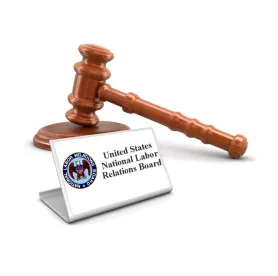Complying with statutory workplace requirements does not necessarily excuse an employer from its bargaining obligations. A panel of the National Labor Relations Board (NLRB) upheld an Administrative Law Judge’s (ALJ) finding that an employer violated the National Labor Relations Act (NLRA) when it refused to bargain over the effects of requiring employees to submit new I-9 forms. Frontier Communications Corp., 370 NLRB No. 131 (May 26, 2021).
The Board’s affirmation highlights the sensitive interaction between mandatory compliance with federal statutes and an employer’s obligations under the NLRA.
In late-2018 or early-2019, the employer conducted an I-9 audit and uncovered extensive noncompliance with the I-9 forms it had on file. To resolve the issues, the employer determined that it would need to obtain new I-9 forms from approximately 95% of its workforce hired after November 6, 1986, and before March 31, 2018. On July 19, 2019, the employer notified its employees by email that they would need to submit new I-9 forms. Soon thereafter, the union complained that it did not receive prior notice of the communication or of the announced I-9 requirement and demanded bargaining on the issue. Ultimately, the employer refused to bargain on the issue, arguing it was not obligated or permitted to bargain over its efforts to comply with federal immigration laws. In response, the union filed an unfair labor practice charge.
The ALJ held, and the NLRB affirmed, that the employer’s directive that employees submit new I-9 forms was a mandatory subject of bargaining because the requirement affects terms and conditions of employment. The ALJ explained that the I-9 forms “clearly affects the terms and conditions of employment, as employees who (for whatever reason) have difficulty completing the I-9 forms risk losing their jobs, among other potential consequences.” The ALJ flatly rejected the employer’s argument that I-9 compliance was not subject to mandatory bargaining because the employer is required to comply with the Immigration Reform and Control Act of 1986 (IRCA). The ALJ explained that IRCA compliance was subject to mandatory bargaining because the employer had discretion over how to comply with IRCA. For example, the ALJ asserts that the employer had discretion on “the amount of time [employer] would give an employee to obtain and present documents that establish the employee’s identity.” Accordingly, the ALJ found the employer violated the NLRA when it refused to bargain with the union concerning how to complete the I-9 forms.
The ruling, in this case, is not that an employer must bargain over whether to comply with the law, but it must bargain over the impact compliance with the law could have on employees’ terms and conditions of employment.
The NLRB’s affirmation of the ALJ’s findings illustrates the fine line between federal compliance and NLRA obligations. Employers must be cautious of how federal or state compliance affects the NLRA obligation to bargain. When an employer is considering updating its personnel files or changing its onboarding process, it should consider whether it implicates any NLRA obligations.







 />i
/>i

